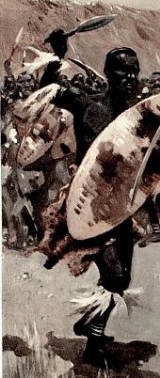
Zulu Kingdom
Encyclopedia
The Zulu Kingdom, sometimes referred to as the Zulu Empire or, rather imprecisely, Zululand, was a monarchy in Southern Africa that extended along the coast of the Indian Ocean from the Tugela River
in the south to Pongola River
in the north.
The small kingdom grew to dominate much of Southern Africa, but when it came into conflict with the British Empire
in the 1870s during the Anglo-Zulu War
, it was defeated despite early Zulu victories in the war. The area was subsequently absorbed into the Colony of Natal and later became part of the Union of South Africa
.
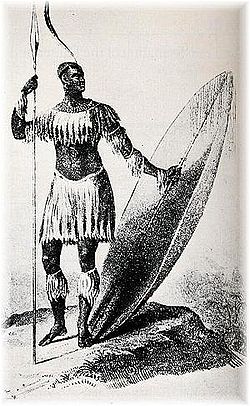
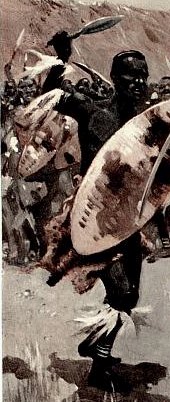 Shaka
Shaka
Zulu was the illegitimate son of Senzangakona
, chief of the Zulus. He was born circa 1787. He and his mother, Nandi
, were exiled by Senzangakona, and found refuge with the Mthethwa
. Shaka fought as a warrior under Dingiswayo
, leader of the Mthethwa Paramountcy. When Senzangakona died, Dingiswayo helped Shaka claim his place as chief of the Zulu Kingdom. After Dingiswayo
's death at the hands of Zwide
, king of the Ndwandwe, around 1818, Shaka assumed leadership of the entire Mthethwa alliance.
Shaka initiated many military, social, cultural and political reforms, forming a well-organized and centralised Zulu state. The most important reforms involved the transformation of the army, thanks to innovative tactics and weapons he conceived; and a showdown with the spiritual leadership, clipping the wings, claws and fangs of the witchdoctor
s, effectively ensuring the subservience of the "Zulu church" to the state.
Another important reform integrated defeated clans into the Zulu, on a basis of full equality, with promotions in the army and civil service becoming a matter of merit rather than due to circumstances of birth.
The alliance under his leadership survived Zwide's first assault at the Battle of Gqokli Hill
(1818). Within two years, Shaka had defeated Zwide at the Battle of Mhlatuze River
(1820) and broken up the Ndwandwe alliance, some of whom in turn began a murderous campaign against other Nguni tribes and clans, setting in motion what became known as Defecane or Mfecane
, a mass-migration of tribes fleeing the remnants of the Ndwandwe fleeing the Zulu. By 1825, Shaka had conquered a huge empire covering an area of around 11500 square miles (29,784.9 km²) from the sea in the east to the Drakensberg
mountains in the west, and from the Pongola River
in the north to the Bashee River in the south, not far from the modern-day city of East London.
An offshoot of the Zulu, the Kumalos, better known to history as the Matabele created an even larger empire under their king Mzilikazi
, including large parts of the highveld
and modern-day Zimbabwe
.
, his half brother, who conspired with Mhlangano, another half-brother, to murder him in 1828. Following this assassination, Dingane murdered Mhlangano, and took over the throne. One of his first royal acts was to execute all of his royal kin. In the years that followed, he also executed many past supporters of Shaka in order to secure his position. One exception to these purges was Mpande
, another half-brother, who was considered too weak to be a threat at the time.
In October 1837, the Voortrekker leader Piet Retief
visited Dingane at his royal kraal to negotiate a land deal for the voortrekkers. In November, about 1,000 Voortrekker wagons began descending the Drakensberg
mountains from the Orange Free State
into what is now KwaZulu-Natal
.
Dingaan asked that Retief and his party retrieve some cattle stolen from him by a local chief. This Retief and his men did, returning on 3 February 1838. The next day, a treaty was signed, wherein Dingaan ceded all the land south of the Tugela River
to the Mzimvubu River to the Voortrekkers. Celebrations followed. On 6 February, at the end of the celebrations, Retief's party were invited to a dance, and asked to leave their weapons behind. At the peak of the dance, Dingane leapt to his feet and yelled "Bambani abathakathi!" (isiZulu for "Seize the wizards"). Retief and his men were overpowered, taken to the nearby hill kwaMatiwane, and executed. Some believe that they were killed for withholding some of the cattle they recovered, but it is likely that the deal was a plot to overpower the Voortrekkers. Dingaan's army then attacked and massacred a group of 250 Voortrekker men, women and children camped nearby. The site of this massacre is today called Weenen, (Afrikaans for "to weep").
The remaining Voortrekkers elected a new leader, Andries Pretorius
, and Dingaan suffered a crushing defeat at the Battle of Blood River
on 16 December 1838, when he attacked a group of 470 Voortrekker settlers led by Pretorius.
border. Mpande then took over rulership of the Zulu nation.
Following the campaign against Dingaan, in 1839 the Voortrekkers, under Pretorius, formed the Boer
republic of Natalia
, south of the Tugela, and west of the British settlement of Port Natal (now Durban
). Mpande and Pretorius maintained peaceful relations. However, in 1842, war broke out between the British and the Boers, resulting in the British annexation of Natalia. Mpande shifted his allegiance to the British, and remained on good terms with them.
In 1843, Mpande ordered a purge of perceived dissidents within his kingdom. This resulted in numerous deaths, and the fleeing of thousands of refugees into neighbouring areas (including the British-controlled Natal). Many of these refugees fled with cattle. Mpande began raiding the surrounding areas, culminating in the invasion of Swaziland
in 1852. However, the British pressured him into withdrawing, which he did shortly.
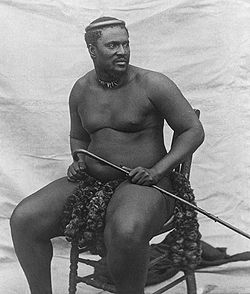 At this time, a battle for the succession broke out between two of Mpande's sons, Cetshwayo
At this time, a battle for the succession broke out between two of Mpande's sons, Cetshwayo
and Mbuyazi. This culminated in 1856 with the Battle of Ndondakusuka, which left Mbuyazi dead. Cetshwayo then set about usurping his father's authority. When Mpande died of old age in 1872, Cetshwayo took over as ruler.
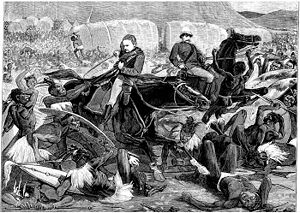 On 11 December 1878, agents of the British delivered an ultimatum to 14 chiefs representing Cetshwayo. The terms of the ultimatum were unacceptable to Cetshwayo. British forces crossed the Tugela river at the end of December 1878. Initially, the British suffered a heavy defeat at the Battle of Isandlwana
On 11 December 1878, agents of the British delivered an ultimatum to 14 chiefs representing Cetshwayo. The terms of the ultimatum were unacceptable to Cetshwayo. British forces crossed the Tugela river at the end of December 1878. Initially, the British suffered a heavy defeat at the Battle of Isandlwana
on 22 January 1879 where the Zulu army killed more than 1,000 British soldiers in a single day. The Zulu deployment at Isandhlwana showed the well-organized tactical system that had made the Zulu kingdom successful for many decades, but their human wave tactics and the poor quality of their troops often cost them much heavier casualties at the hands of firearm-wielding, well-trained British infantry. Nevertheless, this constituted the worst defeat the British army had ever suffered at the hands of a native African fighting force. The defeat prompted a redirection of the war effort, and the British, though outnumbered, began winning victories, culminating in the Siege of Ulundi
, the Zulus' capital city, and the subsequent defeat of the Zulu Kingdom.
. The British passed rule of the Zulu kingdom onto 13 "kinglets", each with his own subkingdom. Conflict soon erupted between these subkingdoms, and in 1882, Cetshwayo was allowed to visit England. He had audiences with Queen Victoria, and other famous personages, before being allowed to return to Zululand, to be reinstated as king.
In 1883, Cetshwayo was put in place as king over a buffer reserve territory, much reduced from his original kingdom. Later that year, however, Cetshwayo was attacked at Ulundi by Zibhebhu
, one of the 13 kinglets, supported by Boer mercenaries. Cetshwayo was wounded and fled. Cetshwayo died in February 1884, possibly poisoned. His son, Dinuzulu
, then 15, inherited the throne.
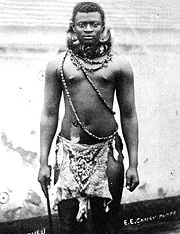 Dinuzulu recruited Boer
Dinuzulu recruited Boer
mercenaries of his own, promising them land in return for their aid. These mercenaries called themselves "Dinuzulu's Volunteers", and were led by Louis Botha
. Dinuzulu's Volunteers defeated Zibhebhu in 1884, and duly demanded their land. They were granted about half of Zululand individually as farms, and formed an independent republic. This alarmed the British, who then annexed Zululand in 1887. Dinuzulu became involved in later conflicts with rivals. In 1906 Dinuzulu was accused of being behind the Bambatha Rebellion
. He was arrested and put on trial by the British for "high treason and public violence". In 1909, he was sentenced to ten years' imprisonment on St Helena island. When the Union of South Africa was formed, Louis Botha became its first prime minister, and he arranged for his old ally Dinuzulu to live in exile on a farm in the Transvaal, where he died in 1913.
Dinuzulu's son Solomon kaDinuzulu
was never recognised by South African authorities as the Zulu king, only as a local chief, but he was increasingly regarded as king by chiefs, by political intellectuals such as John Langalibalele Dube
and by ordinary Zulu people. In 1923, Solomon founded the organisation Inkatha YaKwaZulu to promote his royal claims, which became moribund and then was revived in the 1970s by Mangosuthu Buthelezi
, chief minister of the KwaZulu bantustan. In December 1951, Solomon's son Cyprian Bhekuzulu kaSolomon was officially recognised as the Paramount Chief of the Zulu people, but real power over ordinary Zulu people lay with white South African officials working through local chiefs who could be removed from office for failure to cooperate.
, one of the country's nine provinces, and a large portion of the territory is made up of wildlife reserves and a major contributing source of income is derived from tourism – the area is known for its beautiful savanna
covered hills and stunning views. It is home to a WWF
Black Rhinoceros
reintroduction project known as "The Black Rhino Range Expansion Project" within the Zululand Rhino Reserve (ZRR). The ZRR is a 20,000 hectare reserve consisting of 15 individually owned farms that have lowered their fences in order to further conservation.
Tugela River
The Tugela River is the largest river in KwaZulu-Natal Province, South Africa. The river originates in the Drakensberg Mountains, Mont-aux-Sources, and plunges 947 metres down the Tugela Falls...
in the south to Pongola River
Pongola River
The Pongola River is a river in South Africa. It is a tributary of the Maputo River. It rises near Utrecht in northern KwaZulu-Natal, flows east through Pongola, is dammed at Jozini, and crosses the Ubombo Mountains; then it flows north towards Mozambique, joining the Maputo River....
in the north.
The small kingdom grew to dominate much of Southern Africa, but when it came into conflict with the British Empire
British Empire
The British Empire comprised the dominions, colonies, protectorates, mandates and other territories ruled or administered by the United Kingdom. It originated with the overseas colonies and trading posts established by England in the late 16th and early 17th centuries. At its height, it was the...
in the 1870s during the Anglo-Zulu War
Anglo-Zulu War
The Anglo-Zulu War was fought in 1879 between the British Empire and the Zulu Kingdom.Following the imperialist scheme by which Lord Carnarvon had successfully brought about federation in Canada, it was thought that a similar plan might succeed with the various African kingdoms, tribal areas and...
, it was defeated despite early Zulu victories in the war. The area was subsequently absorbed into the Colony of Natal and later became part of the Union of South Africa
Union of South Africa
The Union of South Africa is the historic predecessor to the present-day Republic of South Africa. It came into being on 31 May 1910 with the unification of the previously separate colonies of the Cape, Natal, Transvaal and the Orange Free State...
.
The rise of the Zulu Kingdom under Shaka


Shaka
Shaka kaSenzangakhona , also known as Shaka Zulu , was the most influential leader of the Zulu Kingdom....
Zulu was the illegitimate son of Senzangakona
Senzangakona
Senzangakhona kaJama was a chief of the Zulu clan, succeeding his father Jama kaNdaba, and primarily notable as the father of Shaka Zulu.- Biography :...
, chief of the Zulus. He was born circa 1787. He and his mother, Nandi
Nandi (mother of Shaka)
Nandi was a daughter of Bhebhe, a past chief of the Langeni tribe and the mother of the legendary Shaka, King of the Zulus.Shaka's father was Senzangakona, chieftain of the Zulu clan, which was small and insignificant at the time...
, were exiled by Senzangakona, and found refuge with the Mthethwa
Mthethwa
Mthethwa could refer to the:* Mtetwa Paramountcy* Nathi Mthethwa, South African minister of police from 2008...
. Shaka fought as a warrior under Dingiswayo
Dingiswayo
Dingiswayo was a Mtetwa chief, best known for his mentorship over a young Zulu general, Shaka Zulu, who rose to become the greatest of the Zulu kings.He was born Godongwana, son of Mthethwa chief Jobe...
, leader of the Mthethwa Paramountcy. When Senzangakona died, Dingiswayo helped Shaka claim his place as chief of the Zulu Kingdom. After Dingiswayo
Dingiswayo
Dingiswayo was a Mtetwa chief, best known for his mentorship over a young Zulu general, Shaka Zulu, who rose to become the greatest of the Zulu kings.He was born Godongwana, son of Mthethwa chief Jobe...
's death at the hands of Zwide
Zwide
Zwide kaLanga was the chief of the Ndwandwe clan from about 1805 to around 1820. He was the son of Langa KaXaba, a Ndwandwe Chieftain. Legend has it that Zwide's mother, Queen Ntombazi was a sangoma.- Political life :...
, king of the Ndwandwe, around 1818, Shaka assumed leadership of the entire Mthethwa alliance.
Shaka initiated many military, social, cultural and political reforms, forming a well-organized and centralised Zulu state. The most important reforms involved the transformation of the army, thanks to innovative tactics and weapons he conceived; and a showdown with the spiritual leadership, clipping the wings, claws and fangs of the witchdoctor
Sangoma
A sangoma is a practitioner of herbal medicine, divination and counselling in traditional Nguni societies of Southern Africa .The philosophy is based on a belief in ancestral spirits...
s, effectively ensuring the subservience of the "Zulu church" to the state.
Another important reform integrated defeated clans into the Zulu, on a basis of full equality, with promotions in the army and civil service becoming a matter of merit rather than due to circumstances of birth.
The alliance under his leadership survived Zwide's first assault at the Battle of Gqokli Hill
Battle of Gqokli Hill
The Battle of Gqokli Hill was conducted in 1818, a part of the Zulu Civil War, between Shaka of the Zulu nation and Zwide of the Ndwandwe, in Shaka's territory just south of present-day Ulundi....
(1818). Within two years, Shaka had defeated Zwide at the Battle of Mhlatuze River
Battle of Mhlatuze River
The Battle of Mhlatuze River was a battle fought between the Zulu and Ndwandwe tribes in 1820 following the Zulu Civil War. The Ndwandwe hierarchy was set asunder by the battle, and largely scattered their population in response.-History:...
(1820) and broken up the Ndwandwe alliance, some of whom in turn began a murderous campaign against other Nguni tribes and clans, setting in motion what became known as Defecane or Mfecane
Mfecane
Mfecane , also known by the Sesotho name Difaqane or Lifaqane, was a period of widespread chaos and warfare among indigenous tribes in southern Africa during the period between 1815 to about 1840....
, a mass-migration of tribes fleeing the remnants of the Ndwandwe fleeing the Zulu. By 1825, Shaka had conquered a huge empire covering an area of around 11500 square miles (29,784.9 km²) from the sea in the east to the Drakensberg
Drakensberg
The Drakensberg is the highest mountain range in Southern Africa, rising to in height. In Zulu, it is referred to as uKhahlamba , and in Sesotho as Maluti...
mountains in the west, and from the Pongola River
Pongola River
The Pongola River is a river in South Africa. It is a tributary of the Maputo River. It rises near Utrecht in northern KwaZulu-Natal, flows east through Pongola, is dammed at Jozini, and crosses the Ubombo Mountains; then it flows north towards Mozambique, joining the Maputo River....
in the north to the Bashee River in the south, not far from the modern-day city of East London.
An offshoot of the Zulu, the Kumalos, better known to history as the Matabele created an even larger empire under their king Mzilikazi
Mzilikazi
Mzilikazi , also sometimes called Mosilikatze, was a Southern African king who founded the Matabele kingdom , Matabeleland, in what became Rhodesia and is now Zimbabwe. He was born the son of Matshobana near Mkuze, Zululand and died at Ingama, Matabeleland...
, including large parts of the highveld
Highveld
The Highveld is a high plateau region of inland South Africa which is largely home to the largest metropolitan area in the country, the Gauteng City Region, which accounts for one-third of South Africa's population.-Location and description:...
and modern-day Zimbabwe
Zimbabwe
Zimbabwe is a landlocked country located in the southern part of the African continent, between the Zambezi and Limpopo rivers. It is bordered by South Africa to the south, Botswana to the southwest, Zambia and a tip of Namibia to the northwest and Mozambique to the east. Zimbabwe has three...
.
Dingane's reign
Shaka was succeeded by DinganeDingane
Dingane kaSenzangakhona Zulu —commonly referred to as Dingane or Dingaan—was a Zulu chief who became king of the Zulu Kingdom in 1828...
, his half brother, who conspired with Mhlangano, another half-brother, to murder him in 1828. Following this assassination, Dingane murdered Mhlangano, and took over the throne. One of his first royal acts was to execute all of his royal kin. In the years that followed, he also executed many past supporters of Shaka in order to secure his position. One exception to these purges was Mpande
Mpande
Mpande , uMsimude owavela ngesiluba phakathi kwamaNgisi namaQadasi, as he was praised, was king of the Zulu nation from 1840 to 1872, making him the longest reigning Zulu king. He was a half-brother of Shaka and Dingane, who both preceded him as kings of the Zulu...
, another half-brother, who was considered too weak to be a threat at the time.
Clashes with Voortrekkers
Before encountering the British, Zulus first were confronted with Boers, for in an attempt to form their own state as a protection against the British, the Boers began moving across the Orange River northwards. While travelling they first collided with the Ndebele kingdom, and then with Dingaan's Zulu kingdom.In October 1837, the Voortrekker leader Piet Retief
Piet Retief
Pieter Mauritz Retief was a South African Boer leader. Settling in 1814 in the frontier region of the Cape Colony, he assumed command of punitive expeditions in response to raiding parties from the adjacent Xhosa territory...
visited Dingane at his royal kraal to negotiate a land deal for the voortrekkers. In November, about 1,000 Voortrekker wagons began descending the Drakensberg
Drakensberg
The Drakensberg is the highest mountain range in Southern Africa, rising to in height. In Zulu, it is referred to as uKhahlamba , and in Sesotho as Maluti...
mountains from the Orange Free State
Orange Free State
The Orange Free State was an independent Boer republic in southern Africa during the second half of the 19th century, and later a British colony and a province of the Union of South Africa. It is the historical precursor to the present-day Free State province...
into what is now KwaZulu-Natal
KwaZulu-Natal
KwaZulu-Natal is a province of South Africa. Prior to 1994, the territory now known as KwaZulu-Natal was made up of the province of Natal and the homeland of KwaZulu....
.
Dingaan asked that Retief and his party retrieve some cattle stolen from him by a local chief. This Retief and his men did, returning on 3 February 1838. The next day, a treaty was signed, wherein Dingaan ceded all the land south of the Tugela River
Tugela River
The Tugela River is the largest river in KwaZulu-Natal Province, South Africa. The river originates in the Drakensberg Mountains, Mont-aux-Sources, and plunges 947 metres down the Tugela Falls...
to the Mzimvubu River to the Voortrekkers. Celebrations followed. On 6 February, at the end of the celebrations, Retief's party were invited to a dance, and asked to leave their weapons behind. At the peak of the dance, Dingane leapt to his feet and yelled "Bambani abathakathi!" (isiZulu for "Seize the wizards"). Retief and his men were overpowered, taken to the nearby hill kwaMatiwane, and executed. Some believe that they were killed for withholding some of the cattle they recovered, but it is likely that the deal was a plot to overpower the Voortrekkers. Dingaan's army then attacked and massacred a group of 250 Voortrekker men, women and children camped nearby. The site of this massacre is today called Weenen, (Afrikaans for "to weep").
The remaining Voortrekkers elected a new leader, Andries Pretorius
Andries Pretorius
Andries Wilhelmus Jacobus Pretorius was a leader of the Boers who was instrumental in the creation of the Transvaal Republic, as well as the earlier but short-lived Natalia Republic, in present-day South Africa....
, and Dingaan suffered a crushing defeat at the Battle of Blood River
Battle of Blood River
The Battle of Blood River, so called due to the colour of water in the Ncome River turning red with blood, was fought between 470 Voortrekkers led by Andries Pretorius, and an estimated 10,000–15,000 Zulu attackers on the bank of the Ncome River on 16 December 1838, in what is today KwaZulu-Natal,...
on 16 December 1838, when he attacked a group of 470 Voortrekker settlers led by Pretorius.
Mpande's reign
Following his defeat, Dingaan burned his royal household and fled north. Mpande, the half-brother who had been spared from Dingaan's purges, defected with 17,000 followers, and, together with Pretorius and the Voortrekkers, went to war with Dingaan. Dingaan was assassinated near the modern SwazilandSwaziland
Swaziland, officially the Kingdom of Swaziland , and sometimes called Ngwane or Swatini, is a landlocked country in Southern Africa, bordered to the north, south and west by South Africa, and to the east by Mozambique...
border. Mpande then took over rulership of the Zulu nation.
Following the campaign against Dingaan, in 1839 the Voortrekkers, under Pretorius, formed the Boer
Boer
Boer is the Dutch and Afrikaans word for farmer, which came to denote the descendants of the Dutch-speaking settlers of the eastern Cape frontier in Southern Africa during the 18th century, as well as those who left the Cape Colony during the 19th century to settle in the Orange Free State,...
republic of Natalia
Natalia
Natalia is a female given name. It is the Latin form of Natalie used also in Italian, Spanish and Polish. Other spellings include Natália Nathália , Natalya , Nataliya , Natalija .-People with the given name Natalia:* Natalia ,...
, south of the Tugela, and west of the British settlement of Port Natal (now Durban
Durban
Durban is the largest city in the South African province of KwaZulu-Natal and the third largest city in South Africa. It forms part of the eThekwini metropolitan municipality. Durban is famous for being the busiest port in South Africa. It is also seen as one of the major centres of tourism...
). Mpande and Pretorius maintained peaceful relations. However, in 1842, war broke out between the British and the Boers, resulting in the British annexation of Natalia. Mpande shifted his allegiance to the British, and remained on good terms with them.
In 1843, Mpande ordered a purge of perceived dissidents within his kingdom. This resulted in numerous deaths, and the fleeing of thousands of refugees into neighbouring areas (including the British-controlled Natal). Many of these refugees fled with cattle. Mpande began raiding the surrounding areas, culminating in the invasion of Swaziland
Swaziland
Swaziland, officially the Kingdom of Swaziland , and sometimes called Ngwane or Swatini, is a landlocked country in Southern Africa, bordered to the north, south and west by South Africa, and to the east by Mozambique...
in 1852. However, the British pressured him into withdrawing, which he did shortly.
Cetshwayo's reign

Cetshwayo
Cetshwayo kaMpande was the King of the Zulu Kingdom from 1872 to 1879 and their leader during the Anglo-Zulu War . His name has been transliterated as Cetawayo, Cetewayo, Cetywajo and Ketchwayo.- Early life :...
and Mbuyazi. This culminated in 1856 with the Battle of Ndondakusuka, which left Mbuyazi dead. Cetshwayo then set about usurping his father's authority. When Mpande died of old age in 1872, Cetshwayo took over as ruler.
Anglo-Zulu War

Battle of Isandlwana
The Battle of Isandlwana on 22 January 1879 was the first major encounter in the Anglo-Zulu War between the British Empire and the Zulu Kingdom...
on 22 January 1879 where the Zulu army killed more than 1,000 British soldiers in a single day. The Zulu deployment at Isandhlwana showed the well-organized tactical system that had made the Zulu kingdom successful for many decades, but their human wave tactics and the poor quality of their troops often cost them much heavier casualties at the hands of firearm-wielding, well-trained British infantry. Nevertheless, this constituted the worst defeat the British army had ever suffered at the hands of a native African fighting force. The defeat prompted a redirection of the war effort, and the British, though outnumbered, began winning victories, culminating in the Siege of Ulundi
Battle of Ulundi
The Battle of Ulundi took place at the Zulu capital of Ulundi on 4 July 1879 and was the last major battle of the Anglo-Zulu War. The British army finally broke the military power of the Zulu nation by defeating the main Zulu army and immediately afterwards capturing and razing the capital of...
, the Zulus' capital city, and the subsequent defeat of the Zulu Kingdom.
Division and the death of Cetshwayo
Cetshwayo was captured a month after his defeat, and then exiled to Cape TownCape Town
Cape Town is the second-most populous city in South Africa, and the provincial capital and primate city of the Western Cape. As the seat of the National Parliament, it is also the legislative capital of the country. It forms part of the City of Cape Town metropolitan municipality...
. The British passed rule of the Zulu kingdom onto 13 "kinglets", each with his own subkingdom. Conflict soon erupted between these subkingdoms, and in 1882, Cetshwayo was allowed to visit England. He had audiences with Queen Victoria, and other famous personages, before being allowed to return to Zululand, to be reinstated as king.
In 1883, Cetshwayo was put in place as king over a buffer reserve territory, much reduced from his original kingdom. Later that year, however, Cetshwayo was attacked at Ulundi by Zibhebhu
Usibepu
Zibhebhu kaMaphitha was a Zulu chief 1883-1884; rival of Cetshwayo.Zibhebhu was a son of Maphita, son of Sojiyisa. He was one of the 13 'kinglets' allocated land in the aftermath of the Anglo-Zulu War, and vied for the royal succession with another of Cetshwayo's sons, Dinuzulu...
, one of the 13 kinglets, supported by Boer mercenaries. Cetshwayo was wounded and fled. Cetshwayo died in February 1884, possibly poisoned. His son, Dinuzulu
Dinuzulu
Dinuzulu kaCetshwayo was the king of the Zulu nation from 20 May 1884 until his death in 1913.He succeeded his father Cetshwayo, who was the last king of the Zulus to be officially recognized as such by the British...
, then 15, inherited the throne.
Dinuzulu's reign and exile

Boer
Boer is the Dutch and Afrikaans word for farmer, which came to denote the descendants of the Dutch-speaking settlers of the eastern Cape frontier in Southern Africa during the 18th century, as well as those who left the Cape Colony during the 19th century to settle in the Orange Free State,...
mercenaries of his own, promising them land in return for their aid. These mercenaries called themselves "Dinuzulu's Volunteers", and were led by Louis Botha
Louis Botha
Louis Botha was an Afrikaner and first Prime Minister of the Union of South Africa—the forerunner of the modern South African state...
. Dinuzulu's Volunteers defeated Zibhebhu in 1884, and duly demanded their land. They were granted about half of Zululand individually as farms, and formed an independent republic. This alarmed the British, who then annexed Zululand in 1887. Dinuzulu became involved in later conflicts with rivals. In 1906 Dinuzulu was accused of being behind the Bambatha Rebellion
Bambatha Rebellion
The Bambatha Uprising was a Zulu revolt against British rule and taxation in Natal, South Africa, in 1906. The revolt was led by Bambatha kaMancinza The Bambatha Uprising was a Zulu revolt against British rule and taxation in Natal, South Africa, in 1906. The revolt was led by Bambatha kaMancinza...
. He was arrested and put on trial by the British for "high treason and public violence". In 1909, he was sentenced to ten years' imprisonment on St Helena island. When the Union of South Africa was formed, Louis Botha became its first prime minister, and he arranged for his old ally Dinuzulu to live in exile on a farm in the Transvaal, where he died in 1913.
Dinuzulu's son Solomon kaDinuzulu
Solomon kaDinuzulu
Solomon kaDinuzulu was the king of the Zulu nation from 1913 until his death on 4 March 1933 at Kambi. He was born on the island of St. Helena during the exile there of his father, king Dinuzulu kaCetshwayo....
was never recognised by South African authorities as the Zulu king, only as a local chief, but he was increasingly regarded as king by chiefs, by political intellectuals such as John Langalibalele Dube
John Langalibalele Dube
John Langalibalele Dube was a South African essayist, philosopher, educator, politician, publisher, editor, novelist and poet. He was the founding president of the South African Native National Congress which became the African National Congress in 1923...
and by ordinary Zulu people. In 1923, Solomon founded the organisation Inkatha YaKwaZulu to promote his royal claims, which became moribund and then was revived in the 1970s by Mangosuthu Buthelezi
Mangosuthu Buthelezi
Inkosi Mangosuthu Buthelezi is a South African Zulu politician who founded the Inkatha Freedom Party in 1975 and continues to lead the party today.His praise name is Shenge.-Early life:...
, chief minister of the KwaZulu bantustan. In December 1951, Solomon's son Cyprian Bhekuzulu kaSolomon was officially recognised as the Paramount Chief of the Zulu people, but real power over ordinary Zulu people lay with white South African officials working through local chiefs who could be removed from office for failure to cooperate.
Modern Zululand
The area is currently part of the Republic of South Africa as KwaZulu-NatalKwaZulu-Natal
KwaZulu-Natal is a province of South Africa. Prior to 1994, the territory now known as KwaZulu-Natal was made up of the province of Natal and the homeland of KwaZulu....
, one of the country's nine provinces, and a large portion of the territory is made up of wildlife reserves and a major contributing source of income is derived from tourism – the area is known for its beautiful savanna
Savanna
A savanna, or savannah, is a grassland ecosystem characterized by the trees being sufficiently small or widely spaced so that the canopy does not close. The open canopy allows sufficient light to reach the ground to support an unbroken herbaceous layer consisting primarily of C4 grasses.Some...
covered hills and stunning views. It is home to a WWF
World Wide Fund for Nature
The World Wide Fund for Nature is an international non-governmental organization working on issues regarding the conservation, research and restoration of the environment, formerly named the World Wildlife Fund, which remains its official name in Canada and the United States...
Black Rhinoceros
Black Rhinoceros
The Black Rhinoceros or Hook-lipped Rhinoceros , is a species of rhinoceros, native to the eastern and central areas of Africa including Kenya, Tanzania, Cameroon, South Africa, Namibia, Zimbabwe, and Angola...
reintroduction project known as "The Black Rhino Range Expansion Project" within the Zululand Rhino Reserve (ZRR). The ZRR is a 20,000 hectare reserve consisting of 15 individually owned farms that have lowered their fences in order to further conservation.
See also
- African military innovation and change
- Anglo-Zulu WarAnglo-Zulu WarThe Anglo-Zulu War was fought in 1879 between the British Empire and the Zulu Kingdom.Following the imperialist scheme by which Lord Carnarvon had successfully brought about federation in Canada, it was thought that a similar plan might succeed with the various African kingdoms, tribal areas and...
- List of Zulu kings
- Postage stamps and postal history of ZululandPostage stamps and postal history of ZululandThis is a survey of the postage stamps and postal history of Zululand under British rule.The Zulu Kingdom was defeated by Britain in the Anglo-Zulu War and was annexed as a British territory in 1887...
- ShakaShakaShaka kaSenzangakhona , also known as Shaka Zulu , was the most influential leader of the Zulu Kingdom....
- Zulu people
External links
- Afropop Worldwide's public radio program on Zulu Music, "The Zulu Factor"
- People of Africa, Zulu marriage explained
- An article on Piet Retief, including his interactions with Dingane
- History section of the official page for the Zululand region
- Human Rights Watch report on KwaZulu, just before the 1994 elections – This includes detailed, well-referenced, sections on recent Zulu history.

